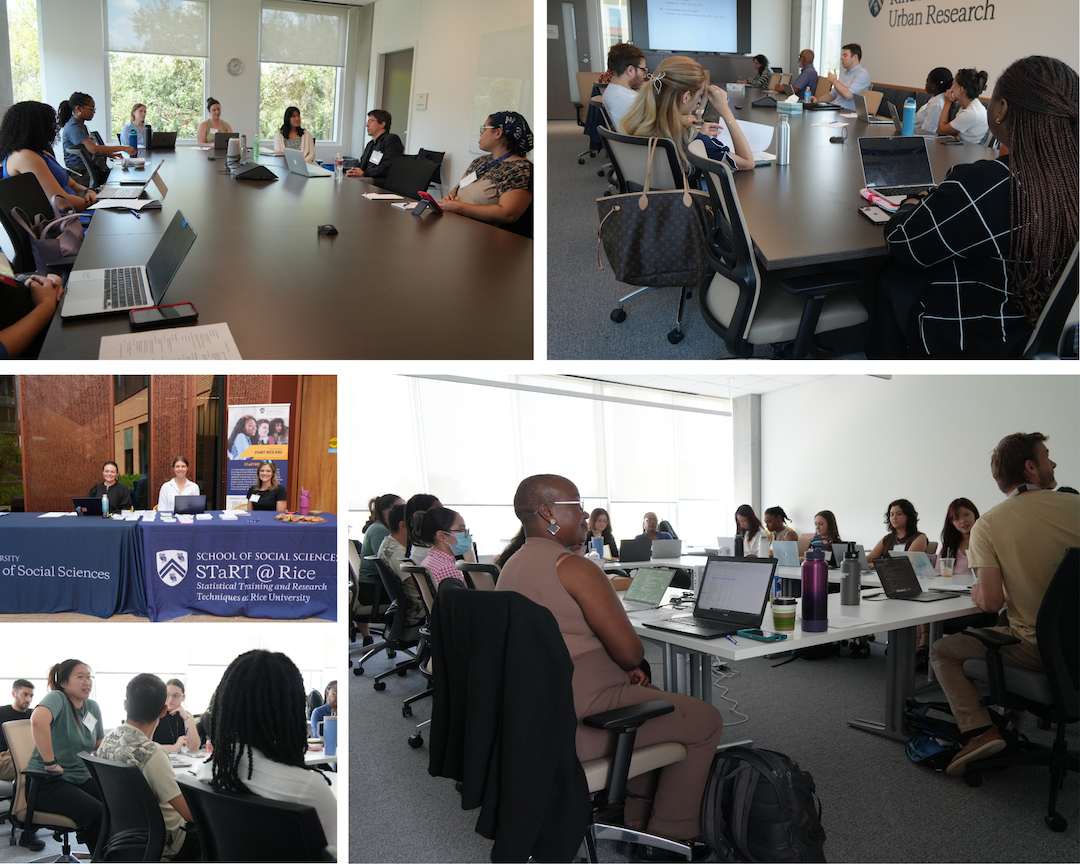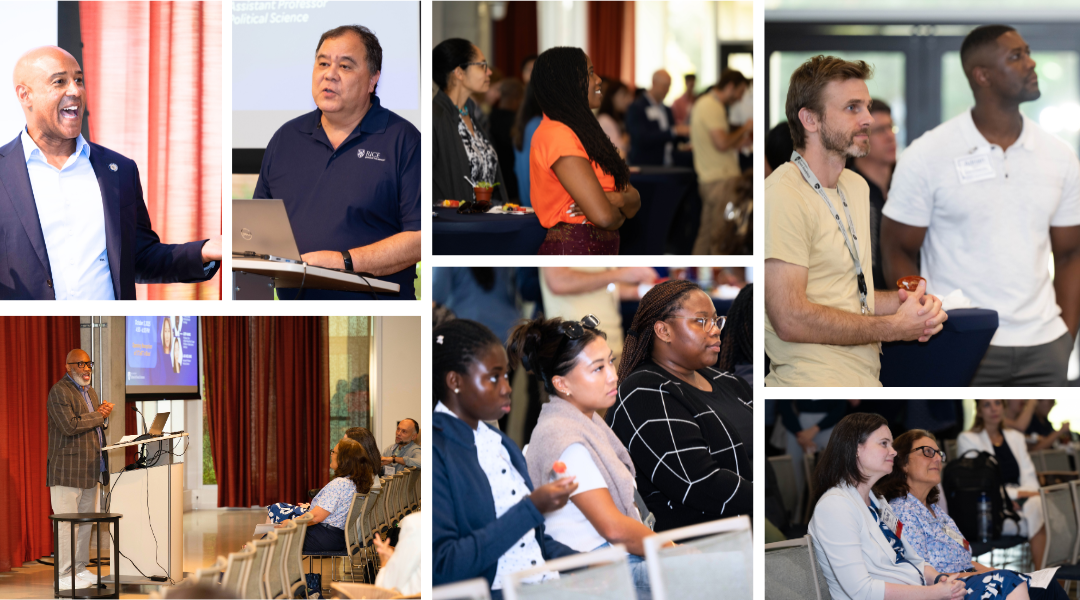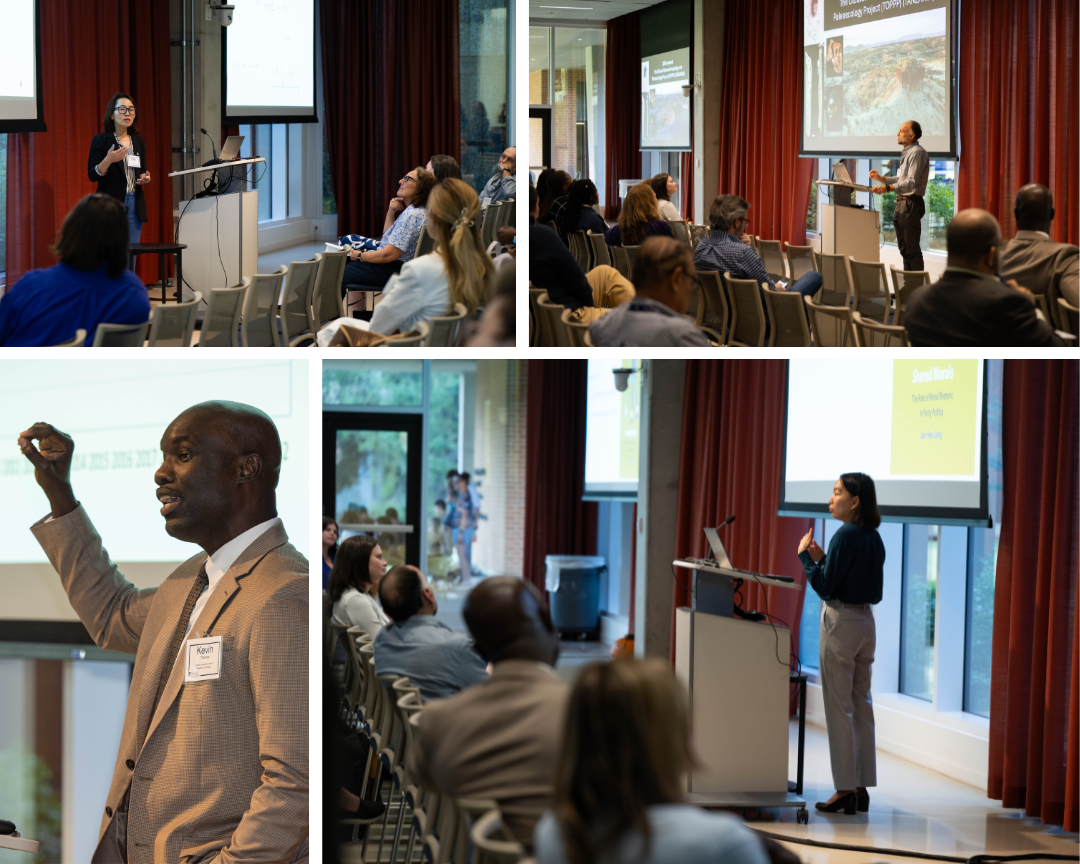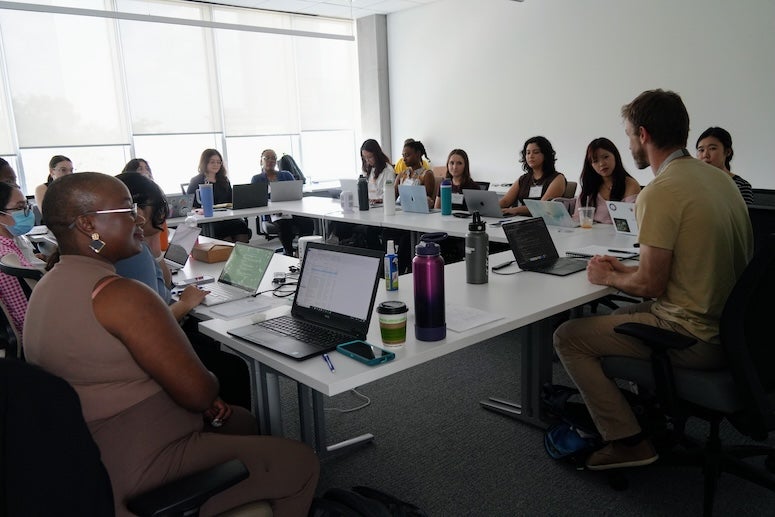When Lexi O’Brien applied to the Statistical Training and Research Techniques at Rice University (STaRT@Rice) program, she saw it as a chance to strengthen the research skills that will one day support her pursuit of a doctorate. A grant specialist at the Kinder Institute for Urban Research and a volunteer research assistant in Bryan Denny’s Affective Neuroscience Lab, O’Brien spends her days supporting social science inquiry — but this time, she was part of it.

That connection came full circle during the Oct. 3 program when Denny, an associate professor of psychological sciences, led one of the hands-on workshops introducing participants to neuroimaging tools used in psychological research.
STaRT@Rice offers what organizers describe as a “panoramic view of the research process,” combining workshops, mentoring and interdisciplinary exposure to help participants at all levels build confidence and capability. Workshops range from introductory to advanced, covering topics such as statistical modeling, data visualization and fMRI methods in cognitive neuroscience.
“In my role at the Kinder Institute, I get to see how social science research informs real-world change every day,” O’Brien said. “STaRT gave me the chance to step into that process myself — to understand how questions take shape, how methods evolve and how collaboration drives discovery.”
A foundation in social sciences
The three-day training program began in 2021 when Tony Brown, distinguished professor of sociology, saw a need to help graduate and prospective graduate students build both confidence and research capability. He created STaRT@Rice to bring students together across departments for immersive methods training and mentoring.

“When we launched STaRT, we wanted to create a space where students from different disciplines could learn side by side — not just about methods but about each other,” Brown said. “Research can feel isolating, especially early on, and this program reminds students they’re part of something larger than their project or field.”
In recent years, the program has continued to grow under the leadership of co-directors Brown and Jing Chen, associate professor of psychological sciences. Now in its fifth year, STaRT@Rice has become a cornerstone of the School of Social Sciences, reflecting the university’s emphasis on interdisciplinary learning and belonging.
The 2025 program brought together more than 60 graduate and prospective graduate students for a series of workshops, mentoring sessions and faculty-led discussions designed to strengthen research skills and collaboration across disciplines.
During the opening ceremony, Dean Rachel Kimbro emphasized the value of shared inquiry.
“Although what we study in the social sciences covers a great range of topics, we have in common the desire to tackle society’s greatest challenges,” Kimbro said. “STaRT brings the school together across every discipline and gives students exposure to new methods — an essential ingredient for answering the important questions we ask.”
Rice President Reginald DesRoches highlighted how the program equips students to think broadly and build lasting relationships that fuel discovery.
“Having a solid foundation in research methods is essential for success in the social sciences,” DesRoches said. “That’s what this program does so well — it gives students the tools and confidence to approach big questions with rigor and creativity.”
He noted that participants consistently praise the program’s hands-on workshops for giving them both the technical skills and confidence to apply new research methods in their own work.
“Learning new techniques is important,” DesRoches said, “but the connections you make along the way — with peers and faculty — are what truly shape your experience at Rice and beyond.”
A glimpse of what’s possible
Before diving into their own workshops, students got an early look at where their research journeys could lead. The opening ceremony featured Research Relays — a fast-paced showcase where new faculty each have four minutes to present their latest work. The format, which debuted in 2022, highlights the breadth of research across the School of Social Sciences and encourages collaboration among departments.

This year’s presenters included Manuel Domínguez-Rodrigo, professor of anthropology, who uses artificial intelligence and machine learning to uncover new clues about early humans’ place on the food chain — findings that are reshaping how scientists understand the origins of human behavior. Kevin J.A. Thomas, distinguished professor of sociology and director of the Kinder Institute’s Houston Population Research Center, discussed his research on international migration and demographic change. Huixia (Judy) Wang, professor and chair of statistics and the William Marsh Rice Trustee Professor in Data Science, shared her development of statistical-learning methods for environmental and biomedical applications. And Jae-Hee Jung, assistant professor of political science, explored how moral rhetoric shapes partisan discourse and public opinion in democratic societies.
Their fast-paced talks reflected what Kimbro described as “the desire to tackle society’s greatest challenges” and offered students a vivid model of where curiosity and method can take them.
Lasting impact
For many students, the weekend reinforced the value of collaboration and community in research.
“What stood out most to me was the focus on mentorship and community building across sessions and even in the breaks,” said Ivanova Veras de Jesus, a postdoctoral associate who attended every workshop. “Academia and research can be isolating. STaRT is designed to break that wall and bring knowledge, training, mentorship and community together.”
Veras de Jesus said she also left with new tools to strengthen her own research.
“I’m excited to use what I learned about meta-analysis in my work,” she said. “We went through each stage of the process and the statistics behind it, and now I get to apply that knowledge to a potential publication.”
For her, the experience was about more than technical skills.
“It brought a sense of belonging and growth that’s often missing from academic spaces,” she said. “It reminded me why I love research — not just for what we discover but for the people and ideas that shape how we get there.”

